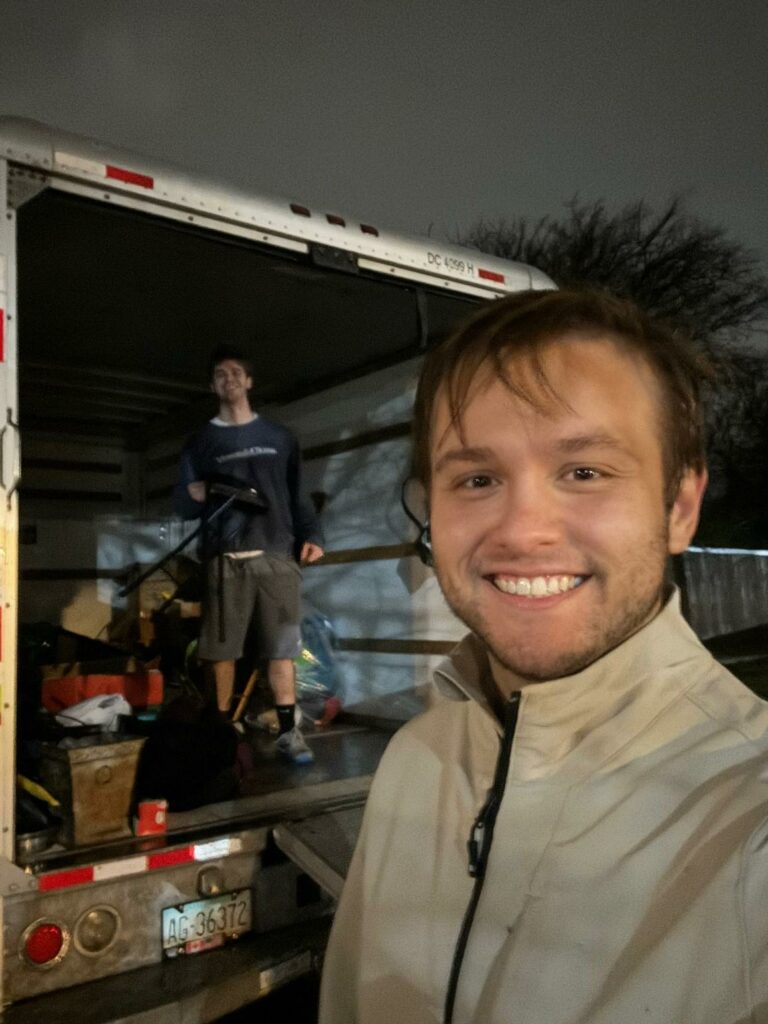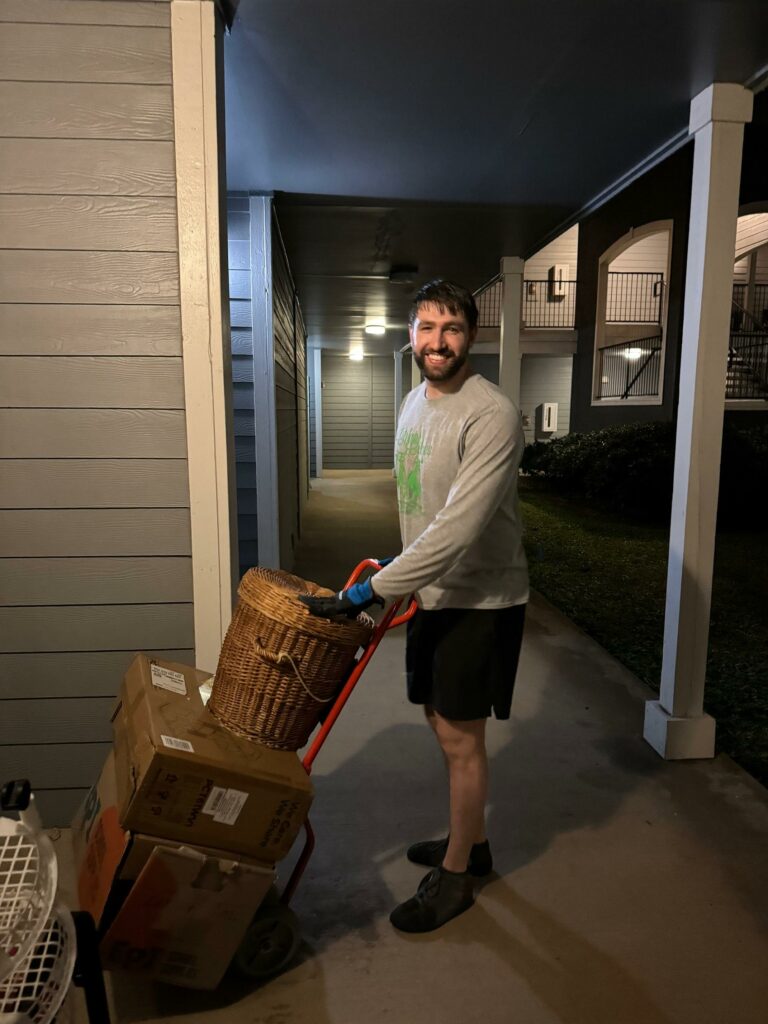When Vinson & Elkins senior associate Eugene Temchenko showed up to a Dallas Volunteer Attorney Program legal clinic last June, he had no idea that he would pick up a pro bono eviction matter that would heavily mirror some of the commercial litigation he handles on a daily basis.
Nor did he know that it would drag out six months and conclude in renting a U-Haul with two colleagues to personally move their client’s belongings from her old home to her new one on the eve of trial, resolving the matter altogether.
What he did know was that he wanted to help Calvalita Browning, a 74-year-old woman living in Section 8 housing and at risk of becoming homeless after an argument with her landlord over her cats escalated to an eviction proceeding.
Half a year, 177 pro bono hours and $167,000 in firm dollars later, Temchenko and fellow V&E associates Paul Hill, Josh Jilovec and Elizabeth Ramsey not only helped keep an indigent elderly woman off the streets, but also gained significant experience relevant to their day-to-day billable work in the process.
“Paul was ready to argue before the county courts and, in case of a loss, was thinking of how to obtain an emergency stay in an appeal,” said Temchenko, the lead attorney on the case. “Josh argued several times before the court and had this entire cross-examination ready, and Elizabeth got pulled in basically with her feet to the fire … [to do] the direct.

Although some of the four associates’ preparation did not materialize in court, the lawyers said all the work they did for the case was valuable regardless — both from a personal fulfillment standpoint and a vocational one.
“Whatever case we’re doing, you have to explain it as simply as possible,” Temchenko added. “It’s all about distilling your complex legal theories, arguments and facts to a simple and presentable point, because there’s no difference between a JP court judge, a county court judge and a juror. You’ve still got to convince them.”
Ramsey, a first-year associate who joined V&E in October, said this matter and the other pro bono work she’s handled since joining the firm have been a great way “to get exposed to lots of different areas” of the law.
“It really does feed your soul,” Ramsey said of pro bono work. “Everyone’s tired [and] stressed, but you can get on the phone for five minutes with the pro bono client and it just makes your day brighter and makes your day happier. It was a great experience and I loved it.”
Springing into Action
The case dates back to last June, when Temchenko arrived at a legal clinic hosted by DVAP, a joint venture between the Dallas Bar Association and Legal Aid of NorthWest Texas. DVAP’s eviction court clinic was actually something that he and V&E pro bono counsel Ellyn Josef helped DVAP launch in early 2021 after noticing that the Houston Bar Association’s Houston Volunteer Lawyers offered something similar.
Like Dallas attorney Mark Melton’s nonprofit organization, Dallas Eviction Advocacy Center, DVAP’s eviction clinic connected volunteer attorneys and tenants facing eviction as they showed up to court for their hearing. Like many regions, evictions in North Texas skyrocketed after financial hardships tied to the the Covid-19 pandemic made it difficult for many low-income tenants to make rent.
Temchenko said Browning was the last person to show up at the clinic, and as he learned more about her case he realized it was far more complicated than the typical landlord-tenant dispute.
For starters, it wasn’t a fight over failure to pay rent, Temchenko said, but rather one over whether Browning had violated her lease agreement with for-cause behavior. It was one with “lots of evidence” to thumb through and “lots of discussions” between Browning and the landlord to catch up on, he said.
Court documents submitted by the landlord suggest the fallout with Browning was a slow burn.
According to exhibits attached to Hillside West Senior LP’s eviction application, the property issued multiple notice of lease violations to Browning between June 2022 and April 2023 that detail allegations of Browning yelling at and being aggressive toward leasing office staff and other residents, dumping pet feces on a neighbor’s front door, letting her undocumented cats roam the hallways at night to relieve themselves, and leaving her apartment in unsanitary conditions, which they say led to a cockroach infestation of multiple units.
“Most of eviction defense ends up being on a procedural basis: Does the landlord follow the various boxes that they have to check? But it’s a for-cause eviction, and I did not have the record,” Temchenko said. “I did not know what exhibits they were going to introduce, and [Browning] doesn’t have anything, of course.”
Temchenko remembers thinking about his grandmother when he first met Browning.
“My grandmother had passed away four months prior to this, and this is a 74-year-old lady that just reminded me of her,” Temchenko said. “If my grandmother didn’t have help, she would be in the exact same [situation]. This lady — she’s got nobody. She has no family, no relatives in the area. She is from Seattle. And if she gets evicted and it’s 115 degrees outside, that’s a matter of life or death.”
Temchenko said he had about five minutes to learn about Browning’s case before arguing on her behalf at the eviction hearing, which took place in Justice of the Peace Court 5 before Judge Sara Martinez.

Temchenko sat back and gathered information as he listened to Hillside West present “multiple arguments for why” Browning should be evicted. Then he conducted a “basic cross-examination,” he said.
“Their primary argument was that she had threatened people at the office and that she had sent threatening emails,” he said. “I asked them, ‘Did you feel threatened by receiving this email?’ And the landlord says, ‘No, I didn’t.’ The problem was that it was just not sufficient time to prepare to develop the record. They had multiple bases, including that they were claiming [she was a holdover tenant] and various other issues.”
Judge Martinez ruled in Hillside West’s favor, ordering a same-day eviction of Browning. With Temchenko’s help, Browning appealed the eviction and submitted a “pauper’s affidavit” that said she couldn’t afford to pay the appeal costs, allowing her to appeal without posting a bond. The landlord appealed the affidavit, but at the hearing to challenge the affidavit a couple days later the landlord did not show up, Temchenko said, and the judge ruled in Browning’s favor, determining that “it’s pretty obvious that [she] can’t pay.”
“Given that she qualified for DVAP representation and lives off Social Security, she automatically qualified,” Temchenko said.
The ruling gave Browning the green light to appeal the eviction to county court, which gave the legal team “a lot more flexibility in terms of collecting evidence, collecting records and trying to build out a case and investigate what actually happened,” Temchenko said. The team filed their appeal, and it landed in Dallas County Court at Law No. 3 before Judge Sally Montgomery.
Temchenko brought Hill and Jilovec on board, and the team began diving into the facts. On Aug. 7, 2023, the parties reached a tentative Rule 11 settlement in which Browning agreed to: 1) move out within 60 days, 2) continue paying rent and 3) refrain from “certain actions regarding pets and third parties,” according to court documents. The parties also signed an agreed judgment that would resolve the underlying JP court eviction ruling in favor of Hillside West.
The extra two months were designed to give Browning buffer time to find a new apartment and square away Section 8 approval with the Dallas Housing Authority, but the parties did not anticipate being essentially ghosted by DHA. Browning reached out every week until mid-September asking DHA to approve the transfer of her Section 8 voucher to a new apartment with no answer before the V&E team got involved. Eventually, DHA told the lawyers that it could not approve Browning’s move because of the pending case, “which is not what the statute says,” Temchenko said.
In the meantime, Browning applied to several apartment buildings with vacancies but they all refused to consider her application until she received a new Section 8 voucher.
The parties worked out another extension that gave Browning another 30 days — until Oct. 31, 2023 — to move out while the lawyers continued working with DHA. In exchange, Browning agreed to a motion to reinstate the underlying action should she not vacate her apartment by the new deadline.
Between Sept. 27 and Oct. 27, the V&E team (which also included partner Becky Matthews) called and emailed DHA 21 times before hearing back. The lawyers eventually reached DHA’s legal counsel, “who takes a week to review and then promptly approves the right to move out,” Temchenko said, which “is really where the process starts” since it is the kickoff point of “her actually getting her new housing approved.”
That approval fell on Oct. 30, which left Browning “with only a single day to 1) apply for new leasing arrangements, 2) be approved and 3) facilitate moving all of her belongings to the new residence,” court records say.
But by that point, Hillside West was unwilling to give Browning another extension. Its lawyer, Jeffrey Leung of HooverSlovacek, filed a second JP court action that asked the court to enforce the parties’ settlement agreement while also alleging underlying breaches of contract.
Efforts to interview Leung for this story were unsuccessful.
Jilovec said the team had already prepared a motion to stay “so that the first action could actually be resolved” before moving on to a second case on the merits.
In putting together this motion, Hill spent 36 hours researching what the grounds are for setting aside Rule 11 agreements in Texas, what rights the other side may have to enforce the settlement agreement and whether they followed the proper procedure.
“The landlord was trying to do something that they shouldn’t have been able to do, which is proceeding in two courts simultaneously,” Jilovec said. “I think when we got to the second JP court trial, the landlord thought that they were simply going to hand the judge the settlement agreement and say that this is enforceable here, which is not correct.”
Jilovec argued the motion to stay before the second JP court, which Temchenko described as channeling “the fire and brimstone” of a “classic Texas lawyer.” The judge sided with him and reset the eviction trial for late December.
“By the time Josh was done with his response argument, the only thing the opposing lawyer could say is, ‘Judge, if you give me five minutes, I’m going to withdraw these motions in county court,’” Temchenko said, and “the judge was not even allowing to stay the case for five minutes to allow the case to be re-tried the same day.”
On the day of the December hearing, Jilovec was ready to go with an eight-or nine-page cross-examination outline for the landlord. As discussed, the landlord’s counsel appeared by telephone since they are based in Houston, but to the V&E team and court’s surprise, the landlord also appeared by telephone.
Jilovec asked for a reschedule, explaining that the parties never agreed for the landlord to appear by phone — especially since the landlord’s representative was five miles away and, “as a matter of course,” landlords usually show up to these hearings in-person, Jilovec added.
Plus, he argued, it was critical for the team to conduct an in-person cross-examination of the landlord. The judge agreed to reset the hearing to Jan. 5.
“My argument was that we had so many fact issues as to whether … she was threatening, whether she had actually ever committed a violation,” Jilovec said. “We didn’t agree that she had committed a violation or whether there was sufficient notice.”
Ramsey agreed.
“When I hear ‘eviction case,’ I think, ‘Okay, this is going to be simple.’ And then I get into the facts and I just see so much evidence for an eviction case — all these citations claiming all of these things [including that] her cats don’t have the right documentation — but you see no evidence that they’re telling her what to provide,” Ramsey said. “They’re claiming she’s threatening, but then I meet her in person, and she’s this sweet old lady with a cane. You could just tell every second you spent on this case meant the entire world to her.”
“It was very interesting to research the legal issues in this case because there are so many little details with these eviction cases, and especially so when you’re dealing with government-assisted housing,” said Jilovec, who has since left V&E. “It took me days to figure out what the law on this was. To expect a tenant to prepare a legitimate case in defense … it’s just a tall task.”
An Unconventional Resolution
Like the previous hearing, the lawyers were prepared to go forward with the rescheduled trial on Jan. 5. But three days before, a call from the client caused them to change course.
“‘My new housing just called me and I can pick up my keys tomorrow,’” Browning told her legal team.
Assuming Browning could move out before Jan. 5, the team figured the entire litigation could be resolved without a trial on the merits because if she was moved out, it would be a case purely about possession, which would be moot. Plus, even though they were confident they would prevail, Jilovec said, they did not want an adverse judgment to jeopardize moving into her new apartment if they did lose.
“Is there any way you can get movers for Thursday?” Temchenko responded.
Browning secured movers, who initially told her they could move her out on that Thursday, but after Browning picked up the keys to her new place Wednesday, Jan. 3, they called back and said they could no longer move her Thursday — but “maybe Friday, maybe Saturday, maybe Sunday,” Temchenko said.
“So then I get a call,” said Josef, the V&E pro bono counsel, during which she was asked if helping a client move violated any ethical boundaries.
There are certain things lawyers can’t do, like paying clients’ bonds, she said, but moving was not forbidden.

“My answer was, ‘You do not have to,’” she said. “For everyone reading this: This is not something we do in every case. I don’t want anyone not taking pro bono matters because they may have to act as movers one day. But I was so incredibly proud of this team seeing it through and really making sure that their client was in the best possible position, which is what we always want of our lawyers and for our clients.”
From 6 p.m. Thursday, Jan. 4, to 5 a.m. Friday, Jan. 5, Temchenko, Hill and Jilovec moved Browning — and her cats — into their new home, which led to a complete dismissal of the litigation.
“It was 11 hours on our feet through the night in 40-degree weather and pouring rain,” Hill said. “My 2-year-old daughter’s favorite book is about this family going on an adventure. There’s a forest, a snowstorm … and the page goes, “You can’t go over it, you can’t go under it, you can’t go around it, we’ve got to go through it.”
“I think for a lot of things in life, the only way forward is through,” Hill said. “And having the grit to be able to do that, whether it’s for yourself or for someone else who can’t get through without someone helping them … it’s just something that I remembered the whole time — the moving in particular — that sometimes the only way forward is through. That’s what we have to do for her and that’s how we’re going to get to where she needs to be.”
“When they said, ‘this is now done,’ it is the best email I’ve ever received,” Josef said.
